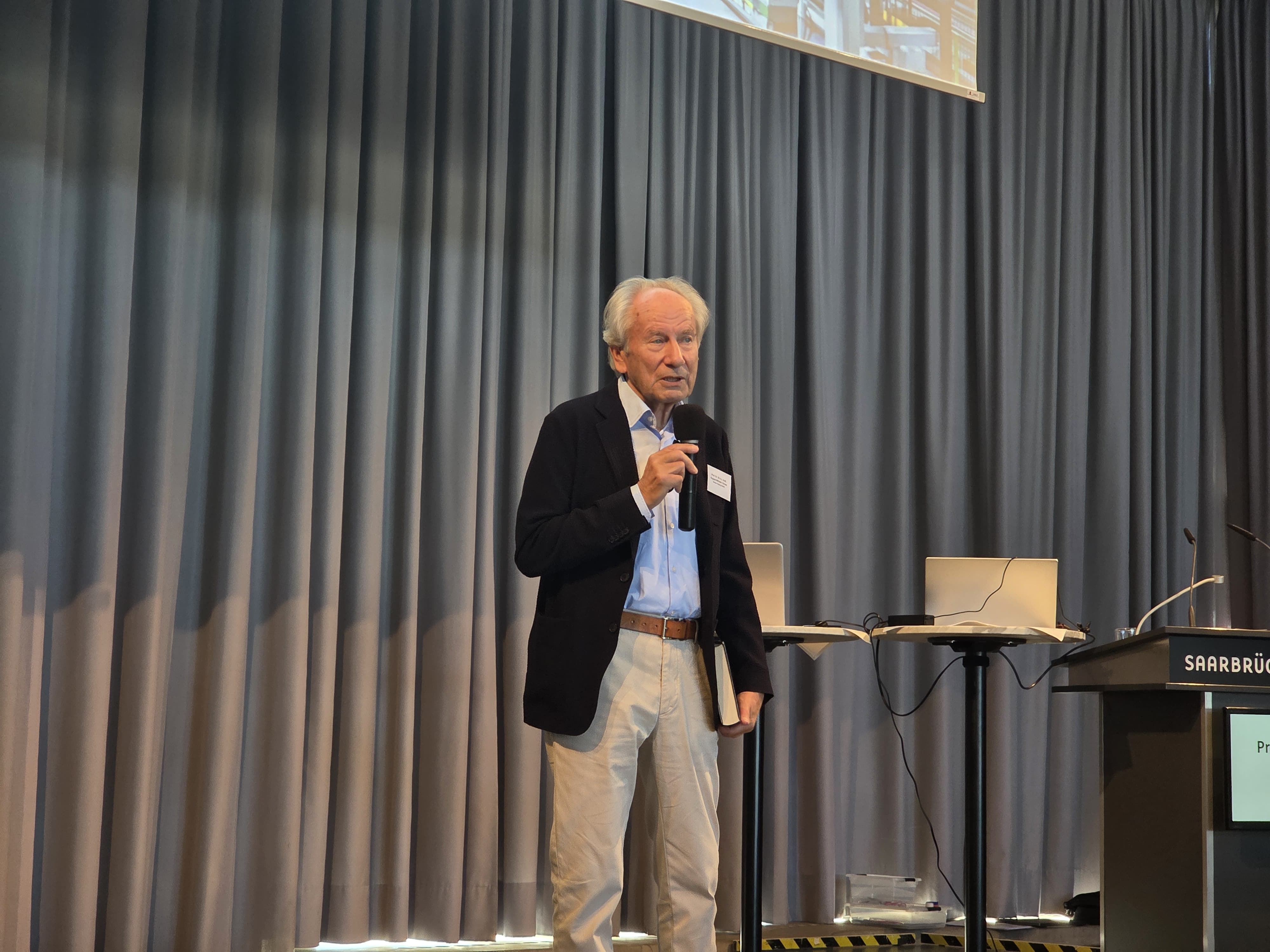Produktionstage Saarbrücken 2025 – A Glimpse into the Future of Industry
On May 14 and 15, 2025, the Production Days took place in Saarbrücken – an event designed by practitioners for practitioners. The aim was to clearly and practically address current challenges and solutions in the manufacturing world. Experts from various industries provided exciting insights into how companies can remain competitive through digital technologies.

Introduction to Digital Transformation by Prof. August-Wilhelm Scheer
The Production Days began with an impressive presentation by Prof. August-Wilhelm Scheer, renowned for his pioneering contributions to digitization. He vividly explained how data management in companies has evolved. Initially, data was stored in isolated software applications and separate databases tailored specifically to finance or production areas. However, with the introduction of Enterprise Resource Planning (ERP) systems, companies could centralize data for the first time, enabling significantly more efficient and process-oriented workflows.
Today, Scheer explained, the situation has become even more complex: companies now utilize integration platforms like SAP, where diverse software solutions and function-specific databases converge. These central interfaces provide ideal conditions for deploying AI agents capable of analyzing and interpreting data in uniform formats.
Scheer also critically noted that many ambitious projects like Gaia-X have so far achieved limited practical success, particularly outside of research contexts. Instead, he emphasized projects such as FactoryX, which currently involves around 80 companies working together to develop market-ready applications. Scheer's conclusion: the software landscape will need significant consolidation to ensure medium-sized enterprises remain innovative and competitive.

Challenges in Volatile Markets – Solutions by Dr. Andreas Weber
Dr. Andreas Weber then addressed the challenges posed by volatile markets. Particularly memorable was his humorous yet impactful example of a petrochemical company discovering unexpectedly high inventory levels of nose hair trimmers through AI.
Weber identified three main drivers necessitating digitalization in plant operations: demographic change, rapidly advancing technology, and transformations in value chains driven by international tariffs and trade barriers. He highlighted that only 20 to 35 percent of current maintenance time is genuinely productive; the rest is taken up by administrative tasks. These ancillary tasks must urgently be reduced, as industry is already heavily pressured by demographic shifts: approximately 40 percent of current employees will leave the industry within the next decade, a loss that cannot be fully compensated even through immigration.
Weber proposed simplifying processes, for example, by using QR codes for quick and easy access to digital product labels. Simultaneously, he advocated streamlining bureaucratic structures to expedite decision-making. Utilizing AI for scenario modeling can generate significant cost savings in the millions by creating more energy- and resource-efficient processes.
Smart Factory: From Paper to Digital Future with Johann Hofmann
Johann Hofmann clearly stated: "Paper equals 100% data loss." His thesis is that medium-sized enterprises must urgently transition completely to digital systems. This involves not just digitizing documents but integrating all operational processes. Hofmann argued that only complete and error-free master data can form the foundation for successful digital transformation.
Especially noteworthy was his vision to transform the traditional Manufacturing Execution System (MES) into a modern Manufacturing Operations Management system (MOM). An MES integrated with AI will become the core element of future production management. However, technology alone is not enough: employees must be actively involved and trust the new systems. Without cultural change and acceptance, every technological innovation will fail.
Hofmann mentioned three major applications of AI in production: automation, optimization, and monitoring. Large Language Models (LLM), image analysis, and wave analysis will play increasingly important roles.
Scaling AI in Global Networks – Erik Schwulera of Siemens
Erik Schwulera from Siemens explained how AI can be effectively deployed in global manufacturing networks. Siemens has established a network of over 30 plants utilizing lean principles and standardized processes to achieve productivity gains of approximately seven percent.
Schwulera emphasized that machines should not be standardized; instead, flexible AI models capable of handling various data sources should be developed. Another critical element is tightly controlling implementation and operating costs to ensure they do not undermine achieved benefits.
Additionally, Schwulera pointed out that there is no longer a need to prove that AI works in principle. Instead, the focus should be on establishing pilot projects that quickly demonstrate concrete benefits.

Innovative Knowledge Management by Bayer and Peerox
Matthias Markus of Bayer AG and Andre Schult of Peerox GmbH presented practical examples of truly effective knowledge management. They demonstrated that traditional methods, where experienced employees input knowledge into databases, typically fail because employees lack the time or motivation to contribute.
Their new approach utilizes AI-supported assistance systems that learn from real-world problem-solving cases and suggest targeted solutions. As a result, production losses were reduced by about 30 percent, and training periods for new employees significantly shortened. Crucially, these solutions succeeded because employees perceived them as genuinely helpful and accepted them.
Data-Driven Savings at FESTO
Eberhard Klotz of FESTO illustrated how data-driven approaches across a machine's entire lifecycle can yield significant savings. By intelligently combining hardware and software, components like pneumatic cylinders can achieve energy savings of up to 70 percent. Predictive maintenance also offers substantial efficiency improvements, as AI can predict failures early and proactively prevent them.
Green Steel Production with Power4Steel
Dr. Sebastian Börner of Saarstahl concluded the event with the ambitious Power4Steel project, aimed at transforming steel production sustainably. Introducing electric arc furnaces and using hydrogen instead of fossil fuels significantly reduces the environmental footprint of steel production. With a budget of around 4.5 billion euros, the project could serve as a blueprint for other industries facing similar challenges.
Conclusion
The Production Days 2025 in Saarbrücken provided numerous innovative impulses, clearly demonstrating how companies can maintain long-term competitiveness through digitization, AI, and sustainable technologies. The intensive exchange between experts and practitioners offered valuable inspiration and guidance for the industry's future.

Benjamin Brockmann
Benjamin Brockmann (M. Sc., Management & Technology) founded Operations1 in 2017 together with Daniel Grobe (also M. Sc., Management & Technology). The founders developed the software solution based on various practical projects, including at the Fraunhofer Institute, and on their experience in industry, auditing and management consulting. Benjamin Brockmann has already worked for companies such as KPMG and Arthur D. Little.